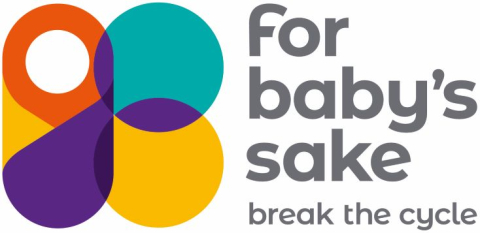At The For Baby’s Sake Trust, we raise awareness of the impact of domestic abuse in the perinatal period. We also work directly with parents affected by domestic abuse - from pregnancy until their baby is two - aiming to break cycles of domestic abuse and give babies the best start in life.
For many expectant parents, pregnancy is a time of excitement and hope. But it is important that employers are also aware it can be a time of escalating harm from domestic abuse. A survey commissioned by The For Baby’s Sake Trust in 2021 with over 2,000 parents found that:
1 in 3 parents have experienced a partner using abusive behaviour towards them.
40% of parents who experienced abuse said it occurred during their baby’s first 1001 days of life (from pregnancy until their second birthday).
40% of those parents who experienced domestic abuse during pregnancy, or during the first two years of their child’s life, didn’t feel able to seek professional help at the time, and a third (33%) said they didn’t know where to begin to look for help. Only 10% received professional help at the time.
Understanding the heightened risk of domestic abuse in pregnancy means that employers can play a powerful role; being alert to the risks and providing support to employees who may be impacted by domestic abuse.
Protecting parents, protecting babies
Domestic abuse in pregnancy is devastating to the abused parent and to the baby. Trauma and adversity during this time can have lasting effects on babies’ development, mental health, and long-term outcomes, starting from their time in the womb. Babies can experience toxic stress in utero, and we now know that domestic abuse during pregnancy is associated with poorer birth outcomes, increased risk of miscarriage and stillbirth, and increased likelihood of involvement with children’s social care.
1 in 5 children in the UK experience domestic abuse, often when still in the womb [Source: NSPCC]. If you’re concerned about the impact of domestic abuse on children in your life, the NSPCC helpline is free and confidential.
47% of Serious Incident Notifications, Rapid Reviews, and Local Child Safeguarding Practice Reviews included reports of domestic abuse. [Source: Domestic Abuse Commissioner]
50,000 babies are referred to Children’s Social Care in England each year with domestic abuse as a factor. 2,000 of these babies enter care. [Source: The For Baby’s Sake Trust, Freedom of Information request to local authorities in England]
The workplace as a place of safety and support
For someone experiencing domestic abuse, the workplace - and supportive relationships with colleagues - can provide a lifeline. This makes the role of employers critical. Pregnancy is a natural point for HR teams and line managers to check on the health and safety of employees and have regular wellbeing conversations, and it is important that these consider all aspects of health – including mental and emotional health and wellbeing. If you have two employees who are in a relationship, it is also important to provide safe, confidential spaces for these conversations to happen. Where domestic abuse-related issues arise, these need to be handled in line with your domestic abuse policy or guidance, safeguarding policy, health and safety policy, anti-bullying and harassment policies, and other employer requirements.
What employers can do to support employees who are pregnant or who have young children
Download Protecting Every Future, a free guide for managers, developed by Domestic Abuse Education, the Domestic Abuse Alliance, and The HR Dept. This provides guidance on embedding wellbeing checks into pregnancy risk assessments and broader workplace culture. At The For Baby’s Sake Trust, we were proud to endorse this initiative and welcome its practical guidance for employers.
And, if your workplace doesn’t already have a domestic abuse policy, make sure to download Sharon’s Policy here - a free template developed in collaboration with EIDA, Domestic Abuse Alliance, and The HR Dept.
1. Embed routine wellbeing questions in pregnancy risk assessments
Asking gentle, open-ended questions about emotional wellbeing during pregnancy risk assessments can help build trust and open the door for disclosures. Questions like “How are things at home?” or “Is there anyone making you feel unsafe or unsupported?” can go a long way.
2. Train managers and HR professionals to spot the signs
Indicators of domestic abuse during pregnancy may include frequent unexplained absences, excessive contact from a partner, isolation from workplace (social) activities or colleagues, or noticeable changes in behaviour and/or appearance. Training can equip teams with the tools to respond appropriately and sensitively.
3. Create a culture of openness and support
Ensure that your workplace policies explicitly address domestic abuse, signpost to support services, and empower employees to seek help. A confidential point of contact or designated Domestic Abuse Champion can be invaluable. If you have physical premises, or a work intranet, find opportunities to raise awareness and signpost to support through posters, leaflets, or online information and guidance.
4. Consider heightened risk with remote working
While the opportunity for remote working has increased flexibility for employees - including employees who are pregnant, parents and carers - it can heighten the risk of exposure to domestic abuse. It is important that you are alert to this in one-to one conversations with employees by offering safe, confidential spaces to talk, including; that you seek, wherever possible, to do pregnancy risk assessments in person, to run some ‘keeping in touch’ meetings in person during maternity leave, and that you carefully consider any requests for remote-based working if office working is the norm.
5. Think about both parents
Domestic abuse can affect all parents, regardless of gender. ONS estimate that 1 in 4 people aged 16 years and over have experienced domestic abuse since the age of 16 years. Split by sex, 1 in 3, or 30.3%, of women and 1 in 5, or 21.7%, of men have experienced domestic abuse since the age of 16 years.
At The For Baby’s Sake Trust, we work with both parents, whether they are using or experiencing abusive behaviour, during and after pregnancy, supporting safe co-parenting and long-term behaviour change. It is also important for employers to be aware of situations where the parent using the abusive behaviour is also in the workplace, and to take appropriate safeguarding action if disclosures of abuse are made.
6. Partner with specialist organisations
Employers don’t need to become domestic abuse experts, but you should know who to turn to. The For Baby’s Sake Trust offers trauma-informed, whole-family support for parents during the perinatal period. We’re always happy to advise employers or provide tailored training and resources.
A shared responsibility
Tackling domestic abuse is everyone’s business. For employers, the perinatal period presents an important opportunity to make a difference, both for parents and for the baby. Your intervention could make the difference between being born into fear and danger, or safety, care, and connection.
By taking proactive steps to support pregnant employees, signposting to services, and fostering an informed, compassionate workplace culture, employers can help break cycles of domestic abuse.
- By Lauren Seager-Smith, CEO, For Baby’s Sake Trust

